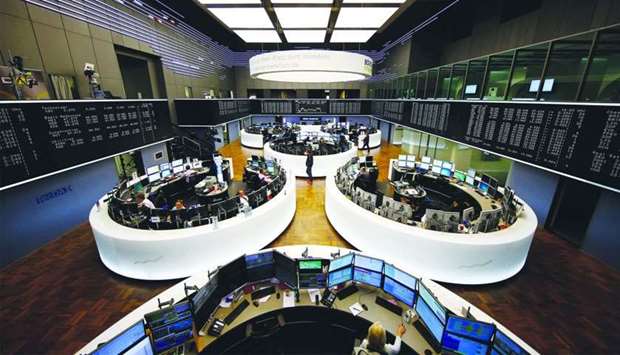World oil prices surged on Thursday on reports that two tankers had been attacked in the Gulf of Oman, worsening frayed tensions in the crude-rich Middle East region, analysts said.
The surge in oil prices boosted share prices of energy companies, while global stock markets also won some support from the prospect of US interest rate cuts this year.
A surge in telecom stocks on Germany's completion of its 5G mobile spectrum auction pulled European shares higher on Thursday, overturning a weak opening as investors continued to worry about global trade tensions.
Shares in 1&1 Drillisch and parent United Internet surged 9% and 5% respectively while market leader Deutsche Telekom gained 1% even as chief Dirk Woessner said the process had led to high prices and left a "bitter aftertaste".
The moves drove the European telecom index 0.6% higher and, allied to gains for oil companies after a surge in crude prices.
In London, the FTSE 100 closed flat at 7,368.57 points, in Frankfurt the DAX 30 closed 0.4% up at 12,169.05 points and Paris' CAC 40 ended flat at 5,375.63 points, while EURO STOXX 50 closed 0.1% up at 3,390.50 points.
The biggest decliner on STOXX 600 was Aurubis AG, down 10.8% after Europe's largest copper producer warned on profits and said its CEO would leave the company immediately.
Thales rose 2.5% after the French defence electronics group raised its profitability target for 2019 as it factored in the contribution of the recently-acquired Gemalto business.
"Focus will now switch to whether Drillisch will proceed with a mobile network build, but it could be several months before the outcome is known," UBS analysts said in a note on the tender.
"We re-iterate our view that both Deutsche and Vodafone are well placed regardless of whether a mobile network build does or does not go ahead."
Europe's benchmark index has risen about 3% this month, undoing roughly half of a sell-off in May that was its worst monthly performance in more than two years.
The recovery has come largely on hopes that the US Federal Reserve and european Central bank will take action to impede any slowdown in global growth in the wake of the trade tensions that have plagued markets and major economies over the past year.
US inflation data on Wednesday raised the number of Federal Reserve rate cuts priced in to the money market to three this year and some analysts worry that is overdone.
Germany's final inflation reading for May came in line with estimates on Thursday and banking stocks, which tend to suffer when expectations for interest rates fall, fell 0.4%.
"The expectations that central banks would intervene and might cut rates and start stimulating again, acts as a sort of buffer," said Teeuwe Mevissen, senior macro strategist at Rabobank.
Rising hopes of a rate cut has helped to offset lingering tensions over the long-running trade war between Washington and Beijing.
Thursday's suspected tanker attacks, a second incident involving shipping in the strategic sea lane within just weeks, sent London's Brent North Sea oil rebounding more than 4% in morning deals before trimming gains.
The Gulf of Oman lies along part of a vital shipping lane through which at least 15mn barrels of crude oil and hundreds of millions of dollars of non-oil imports pass each day.
"Tension across the Middle East is high — and the attacks on two tankers has further exacerbated the situation, even though there does not appear to have been any damage to the cargos," said John Hall, chairman of British-based consultancy Alfa Energy.
"As a consequence the market has responded dramatically with an increase in the oil price of (as much as) 4%," he told AFP.
"How long it will hold for is another matter — and it has already fallen back slightly."
Both Brent oil futures in London and New York's West Texas Intermediate were up around 3% on the day by the end of European business.
It was a huge turnaround for the oil market, which had slumped on Wednesday on news of soaring crude inventories in the United States that indicated weak demand growth.
Thursday's reported attacks came amid simmering tensions between Tehran and Washington.
Markets are paying particularly close attention after US President Donald Trump abandoned a landmark 2015 nuclear deal with Iran last year.
"Investors will be keeping a keen eye on the developments in the Gulf of Oman as tensions in the Middle-East have been rising since President Trump withdrew from the Iran deal," Sun Global Investments chief Mihir Kapadia said in a note.
"Although US National Security Adviser John Bolton has accused Iran of a similar incident before, the country has distanced itself from today's attacks.
"From this, the biggest concern will be a retaliation which could leave markets looking shaky in the meantime," Kapadia added.
Geordie Wilkes, head of research at Sucden Financial, said: "It is too soon to compare recent action to the 1980s when there was a tanker war between Iran and Iraq as they attempted to stop each other from exporting oil."
However, he warned that "persistent attacks could increase risks high enough for vessels to not travel through the area," a development that would force energy prices higher.
In commodity deals elsewhere, cocoa prices retreated one day after striking an 11-month peak.
The market had soared on Wednesday on news that key producers Ivory Coast and Ghana have threatened to stop selling their production to buyers who do not meet a minimum price level.

